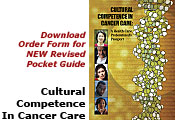|
Multimedia Resources
Clinical Trials: A Primer
|
When it comes to creating an accurate picture of what it takes to cure diseases and develop vaccines, a few pieces of the puzzle are missing.
Racial and ethnic minorities suffer disproportionately from diseases such as cancer, diabetes and HIV. While research has proven to be integral to prevention, the Intercultural Cancer Council (ICC),  which works to reduce minority disparities in cancer, is tackling low minority participation in clinical trials.
which works to reduce minority disparities in cancer, is tackling low minority participation in clinical trials.
 "The role of a clinical trial is to ensure that advances in science are fully benefiting as many people as possible," said Dr. Armin D. Weinberg, professor of medicine at Baylor College of Medicine
"The role of a clinical trial is to ensure that advances in science are fully benefiting as many people as possible," said Dr. Armin D. Weinberg, professor of medicine at Baylor College of Medicine  in Texas and director of its Chronic Disease Prevention and Control Research Center.
in Texas and director of its Chronic Disease Prevention and Control Research Center.
A 2005 study in the Journal of Clinical Oncology showed that racial minorities "were reluctant to participate," regardless of their knowledge about trials. The Journal also pointed out that young people 18-24 were also reluctant to participate in a clinical trial.
Dr. Primo Lara Jr., director of the UC Davis Cancer Center Clinical Trials Support Unit and professor of medicine, said "this suggests that we would have to go beyond just increasing awareness for these particular groups to increase one's willingness to participate in clinical trials."
Reluctance to participate can result in skewed findings or the cancellation of the clinical trial, because minimum participation requirements weren't met.
 under the Intercultural Cancer Council (ICC)
under the Intercultural Cancer Council (ICC)  and Baylor, community leaders from several sectors are working to end disparities in clinical trials in the areas of asthma and cancer.
and Baylor, community leaders from several sectors are working to end disparities in clinical trials in the areas of asthma and cancer.
Funded by Genentech, Inc., the four-year and $4.4 million initiative is divided into two groups, policy and research. The policy research branch addresses the health policy and patient advocacy that affects recruitment of targeted populations. The field research demonstration focuses on the barriers and aids to recruitment and retention of the targeted populations in order to develop outreach materials, particularly for cancer and asthma trials.
"This is where EDICT can help end health disparities," explains Dr. Weinberg. "It puts policy and application side-by-side so when we look at policy, we'll have a better understanding of the environment in which these policies can bring about change."
The major barrier is access, Dr. Keydron Guinn post-doctoral fellow at the Baylor College of Medicine said. "Access could very well be something as simple as transportation. Or could be the person's inability to take off work and go to the trial."
Research to explain the low participation of minorities in clinical trials has pointed to low literacy, cost or lack of health insurance, lack of awareness and invitation, language differences and mistrust.
"When it comes to African Americans and clinical trials, there's this idea of a trust issue. We are a lot less trusting of clinical trials, because of what happened in the past, for example, the Tuskegee incident," Guinn said. "People don't want to be guinea pigs when it comes to pushing someone else's agenda."
The National Cancer Institute's Prostate Cancer Prevention Trial recruited 18,000 men, of which only eight percent were minorities. From January 2003 through June 2005, about 89 percent of participants were Caucasians, while minority groups comprised the remaining 11 percent.
Despite instances of unethical practices in clinical trials, Dr. Rochelle Rollins, from the division of data and policy for the Office of Minority Health, said those instances should not deter people from participating.
"You don't ask any population to get over what has happened in the past because you need to remember," Rollins said. "I think progress is being made and people should not forget, but aiming low should not be accepted."
Roundtable discussions for the EDICT Project took place in September 2006. The meeting tackled the issue of minority participation on the policy level through nine different areas,  including community involvement, pharmacology, public and institutional education and insurance coverage, EDICT Project Manager Cindy Spiker said.
including community involvement, pharmacology, public and institutional education and insurance coverage, EDICT Project Manager Cindy Spiker said.
"It is not just minorities. It's the rural, the elderly, and other underrepresented populations as well. The majority of participants are white married men. We need to make sure the drug in a trial works on all populations," Spiker said.
Dr. Weinberg, who co-founded ICC, agrees. The main areas touch on everything from what can be done on a national level, such as policy making, to local level involvement by community members.
However, some people still believe that participating in a clinical trial has more costs and risks than benefits, and don't see it as something as urgent as blood and organ donations, for instance. With a background in medical sociology, Guinn said "altruism" has not been enough to get people to participate in clinical trials.
"I think people understand the function of blood," Guinn said. "People understand blood is a necessity for human life, but for people who aren't cancerous, they can't understand inclusion in a clinical trial. You say "clinical trials" and the wall comes up - they don't learn."
Dr. Rollins thinks the advantages of clinical trials are undeniable.
"Minorities benefit and society benefits from having a diverse population in clinical trials. Clinical trials are the mechanism for discovering if the vaccine works," she said. "If done right, EDICT can have a major impact on health."
--
Fia Curley is a writer for the OMHRC. Comments? Email: fcurley@omhrc.gov
Links
EDICT
http://www.bcm.edu/edict/ 
Intercultural Cancer Council
http://iccnetwork.org/ 
Cancer Programs and Research
http://www.hhs.gov/chdprg/research.html
Health Disparities
http://www.hhs.gov/chdprg/library.html
You will need Adobe Acrobat® Reader™ to view PDF files located on this site. If you do not already have Adobe Acrobat® Reader™, you can download here for free.

You will need Real Player to view files located on this site. If you do not already have Real Player, you can download here.



